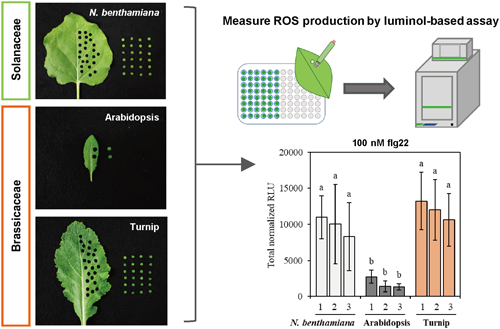- 著者
- Seung-won Choi Kie Kumaishi Reiko Motohashi Harumi Enoki Wiluk Chacuttayapong Tadashi Takamizo Hiroaki Saika Masaki Endo Tetsuya Yamada Aya Hirose Nobuya Koizuka Seisuke Kimura Yaichi Kawakatsu Hiroyuki Koga Emi Ito Ken Shirasu Yasunori Ichihashi
- 出版者
- Japanese Society for Plant Biotechnology
- 雑誌
- Plant Biotechnology (ISSN:13424580)
- 巻号頁・発行日
- vol.39, no.3, pp.323-327, 2022-09-25 (Released:2022-09-25)
- 参考文献数
- 28
Agrobacterium-mediated transformation is a key innovation for plant breeding, and routinely used in basic researches and applied biology. However, the transformation efficiency is often the limiting factor of this technique. In this study, we discovered that oxicam-type nonsteroidal anti-inflammatory drugs, including tenoxicam (TNX), increase the efficiency of Agrobacterium-mediated transient transformation. TNX treatment increased the transformation efficiency of Agrobacterium-mediated transformation of Arabidopsis thaliana mature leaves by agroinfiltration. The increase of efficiency by TNX treatment was not observed in dde2/ein2/pad4/sid2 quadruple mutant, indicating that TNX inhibits the immune system mediated by jasmonic acid, ethylene, and salicylic acid against to Agrobacterium. We also found that TNX-treatment is applicable for the transient expression and subcellular localization analysis of fluorescent-tagged proteins in Arabidopsis leaf cells. In addition, we found that TNX increases the efficiency of Agrobacterium-mediated transient transformation of Jatropha. Given that treatment with oxicam compounds is a simple and cost effective method, our findings will provide a new option to overcome limitations associated with Agrobacterium-mediated transformation of various plant species.
- 著者
- Lalita Jantean Kentaro Okada Yaichi Kawakatsu Ken-ichi Kurotani Michitaka Notaguchi
- 出版者
- Japanese Society for Plant Biotechnology
- 雑誌
- Plant Biotechnology (ISSN:13424580)
- 巻号頁・発行日
- vol.39, no.4, pp.415-420, 2022-12-25 (Released:2022-12-25)
- 参考文献数
- 28
Reactive oxygen species (ROS) are critical for plant biological processes. As signaling molecules, ROS regulate plant growth and development through cell expansion, elongation, and programmed cell death. Furthermore, ROS production is induced by microbe-associated molecular patterns (MAMPs) treatment and biotic stresses, and contributes to plant resistance to pathogens. Thus, MAMP-induced ROS production has been an indicator for plant early immune responses or stress responses. One of widely used methods for the measurement is a luminol-based assay to measure extracellular ROS production with a bacterial flagellin epitope (flg22) as a MAMP elicitor. Nicotiana benthamiana is susceptible to a wide variety of plant pathogenic agents and therefore commonly used for ROS measurements. On the other hand, Arabidopsis thaliana, many of genetical lines of which are available, is also conducted to ROS measurements. Tests in an asterid N. benthamiana and a rosid A. thaliana can reveal conserved molecular mechanisms in ROS production. However, the small size of A. thaliana leaves requires many seedlings for experiments. This study examined flg22-induced ROS production in another member of the Brassicaceae family, Brassica rapa ssp. rapa (turnip), which has large and flat leaves. Our experiments indicated that 10 nM and 100 nM flg22 treatments induced high ROS levels in turnip. Turnip tended to have a lower standard deviation in multiple concentrations of flg22 treatment. Therefore, these results suggested that turnip can be a good material from the rosid clade for ROS measurement.

